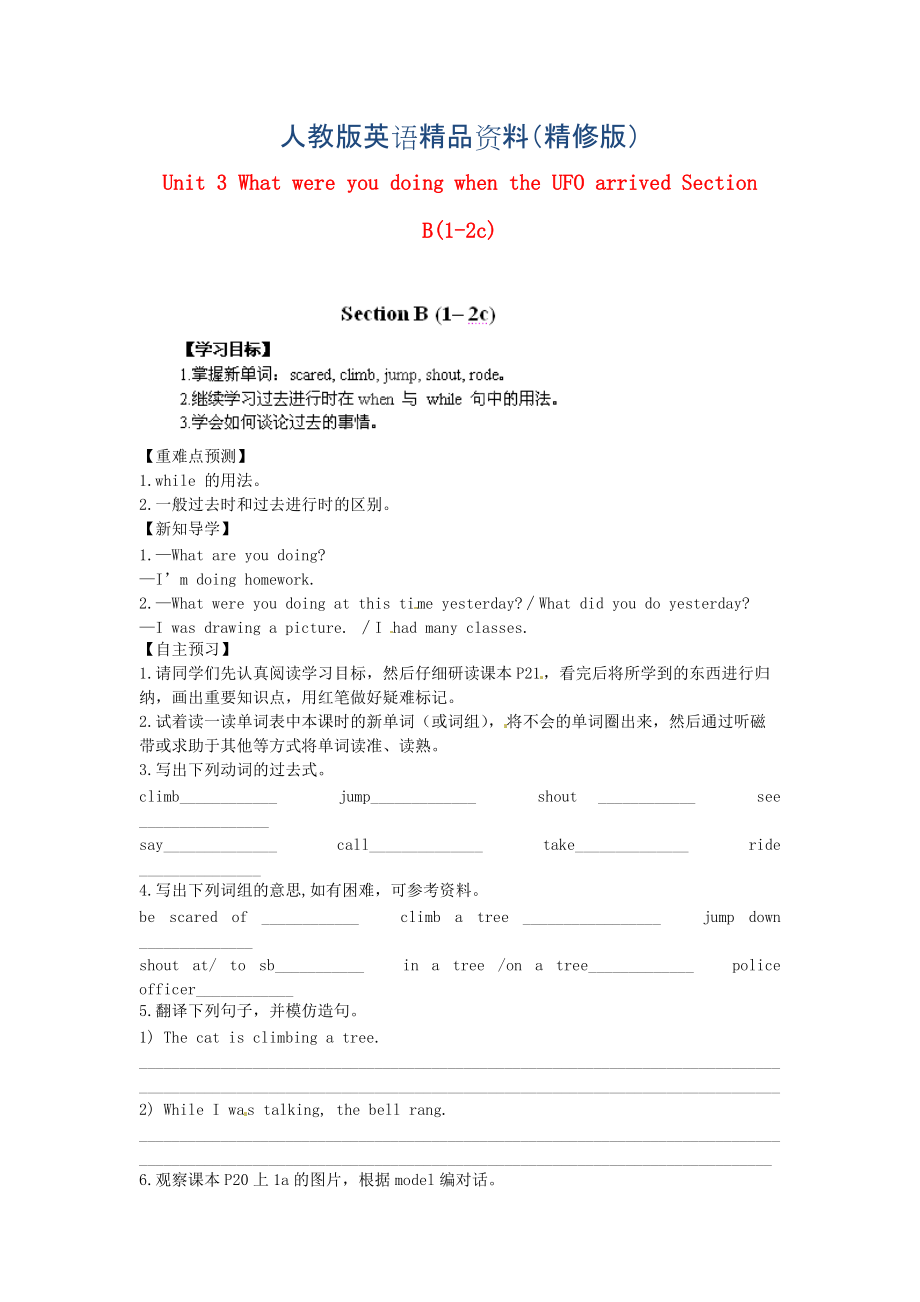《江西省八年級(jí)英語(yǔ)下冊(cè) Unit 3 What were you doing when the UFO arrived Section B(12c)導(dǎo)學(xué)案 人教新目標(biāo)版精修版》由會(huì)員分享�����,可在線閱讀���,更多相關(guān)《江西省八年級(jí)英語(yǔ)下冊(cè) Unit 3 What were you doing when the UFO arrived Section B(12c)導(dǎo)學(xué)案 人教新目標(biāo)版精修版(3頁(yè)珍藏版)》請(qǐng)?jiān)谘b配圖網(wǎng)上搜索��。
1���、人教版英語(yǔ)精品資料(精修版)
Unit 3 What were you doing when the UFO arrived Section B(1-2c)
【重難點(diǎn)預(yù)測(cè)】
1.while 的用法。
2.一般過(guò)去時(shí)和過(guò)去進(jìn)行時(shí)的區(qū)別�����。
【新知導(dǎo)學(xué)】
1.—What are you doing?
—I’m doing homework.
2.—What were you doing at this time yesterday?∕What did you do yesterday?
—I was drawing a picture. ∕I had many classe
2、s.
【自主預(yù)習(xí)】
1.請(qǐng)同學(xué)們先認(rèn)真閱讀學(xué)習(xí)目標(biāo)����,然后仔細(xì)研讀課本P21,看完后將所學(xué)到的東西進(jìn)行歸納���,畫出重要知識(shí)點(diǎn)��,用紅筆做好疑難標(biāo)記���。
2.試著讀一讀單詞表中本課時(shí)的新單詞(或詞組),將不會(huì)的單詞圈出來(lái)�����,然后通過(guò)聽磁帶或求助于其他等方式將單詞讀準(zhǔn)��、讀熟�。
3.寫出下列動(dòng)詞的過(guò)去式。
climb____________ jump_____________ shout ____________ see ________________
say______________ call______________ take______________ rid
3���、e _______________
4.寫出下列詞組的意思,如有困難���,可參考資料�����。
be scared of ____________ climb a tree _________________ jump down ______________
shout at/ to sb___________ in a tree /on a tree_____________ police officer____________
5.翻譯下列句子��,并模仿造句�。
1) The cat is climbing a tree.
________
4�、______________________________________________________________________________________________________________________________________________________
2) While I was talking, the bell rang.
___________________________________________________________________________________________________________
5、__________________________________________________
6.觀察課本P20上1a的圖片�,根據(jù)model編對(duì)話。
A: What is the girl doing?
B: She’s shouting.
Picture b:
A: ____________________________________________________________________________
B: _______________________________________________________________________
6���、_____
Picture c:
A: ____________________________________________________________________________
B: ____________________________________________________________________________
Picture d:
A: __________________________________________________________________________
7、_
B:____________________________________________________________________________【合作探究】
任務(wù)1:完成課本P21上2a和2b的聽力訓(xùn)練題�,在聽之前充分利用2a表格中的詞組和2b表中的人物大膽預(yù)測(cè)聽力內(nèi)容,為聽力做好鋪墊����。
任務(wù)2:講故事。聽力完成之后���,讀一讀聽力材料���,再用while在小組內(nèi)講一講這個(gè)故事�,注意一般過(guò)去時(shí)和過(guò)去進(jìn)行時(shí)的運(yùn)用�。
考點(diǎn)聚焦
◆一般過(guò)去時(shí)和過(guò)去進(jìn)行時(shí)的區(qū)別
1.一般過(guò)去時(shí):過(guò)去某個(gè)時(shí)間發(fā)生的動(dòng)作、存在的狀態(tài)或過(guò)去經(jīng)常發(fā)生的動(dòng)作���。謂語(yǔ)動(dòng)詞用動(dòng)詞的過(guò)去式�,常與ago, yeste
8���、rday, in 2010, last week(year, night, month…) �,just now等連用����。如:I bought a skirt for my daughter yesterday.
Miss Green was in the classroom a moment ago.
2.過(guò)去進(jìn)行時(shí):表示過(guò)去某一時(shí)刻或某一段時(shí)間內(nèi)正在進(jìn)行或發(fā)生的動(dòng)作,由was/were +動(dòng)詞的-ing形式構(gòu)成����,常與this time yesterday, at that time, at 9:00 last night等時(shí)間狀語(yǔ)以及when和while等引導(dǎo)的時(shí)間狀語(yǔ)從句連用。如:
T
9�、hey were singing songs this time last night.
It was raining when I arrived at the station.
He was selling the newspaper while he was waiting for the bus.
練一練:用詞的適當(dāng)形式填空
1. My mother ______________ (clean) the bedroom five minutes ago.
2. When I left the office, it ____________ (rain) heavily.
10、3. When ___________you ___________ (go) to bed last night?
4. What ____________the boys_____________ (do) when you saw them?
◆shout to 與shout at 區(qū)別
shout to sb.是為了讓那人聽到或聽清而大喊���。
shout at sb.是因?yàn)樯鷼舛巧埔獾叵蚰橙撕?�,帶有攻擊性?
練一練:用at 和to 填空
1. Don’t shout __________ the old lady. It is impolite.
2. My frien
11�、d shouted __________ me to give her a hand.
【學(xué)案整理】
___________________________________________________________________________________________________________________________________________________________________________________________________________________________________________________________________________________________________________________________
Section B (1– 2c)
練一練:1.cleaned 2.was raining 3.did, go 4.were ,doing
練一練:1.at 2. to
 江西省八年級(jí)英語(yǔ)下冊(cè) Unit 3 What were you doing when the UFO arrived Section B(12c)導(dǎo)學(xué)案 人教新目標(biāo)版精修版
江西省八年級(jí)英語(yǔ)下冊(cè) Unit 3 What were you doing when the UFO arrived Section B(12c)導(dǎo)學(xué)案 人教新目標(biāo)版精修版

